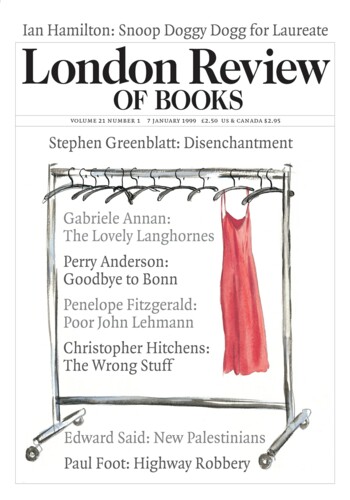Penelope Fitzgerald
Penelope Fitzgerald was the author of nine novels, including Offshore, which won the Booker Prize in 1979, and The Blue Flower. She wrote nearly fifty pieces for the LRB before her death in 2000 on subjects including Stevie Smith, Radclyffe Hall, Charlotte Mew, Anne Enright and Edward White Benson. A collection of some of her essays for the paper is available from the LRB store. Jenny Turner wrote about the difficulties of her life and the method of her books, ‘building then shattering and compressing the piles of information’.
Pieces about Penelope Fitzgerald in the LRB
Making Do and Mending: Penelope Fitzgerald’s Letters
Rosemary Hill, 25 September 2008
In 1997, three years before her death, Penelope Fitzgerald asked her American publisher, Chris Carduff, who had offered to send her any books she wanted, for a copy of Wild America by Roger Tory...
Playing the Seraphine: Penelope Fitzgerald
Frank Kermode, 25 January 2001
This is a collection of eight stories, the oldest first published in 1975, the most recent in 1999; so they punctuate the entire, brief career of a writer who never yielded to the temptation to go on...
Dark Fates
Frank Kermode, 5 October 1995
Penelope Fitzgerald’s The Blue Flower is a historical novel based on the life of the poet, aphorist, novelist, Friedrich von Hardenberg, a Saxon nobleman who wrote under the name of Novalis...
Taken with Daisy
Peter Campbell, 13 September 1990
Penelope Fitzgerald’s new novel, like her last one, The Beginning of Spring, is set just before the First World War. Its locale, 1912 Cambridge, is not much less exotic than its...
Women’s Fiction
Margaret Walters, 13 October 1988
Penelope Fitzgerald has always seemed a quintessentially English novelist, low-key, exquisitely perceptive, and with a notable feeling for place – the seedy houseboats on the Thames in
Chiara Ridolfi
C.K. Stead, 9 October 1986
Penelope Fitzgerald’s Innocence is set in Florence, the principal characters are Italian, and I kept asking myself: how is it done? She knows quite a lot about Italian society: but more...
Finishing Touches
Susannah Clapp, 20 December 1984
On 24 March 1928 Charlotte Mew killed herself by drinking a bottle of disinfectant in a nursing-home near Baker Street. She left behind her a volume of poems, a number of uncollected essays and...
Nationalities
John Sutherland, 6 May 1982
A new novel by Günter Grass invites comparisons of a national kind. If a British writer of fiction wished to engage with the big stories of the day – the kind of thing Brian Walden...
The Duckworth School of Writers
Frank Kermode, 20 November 1980
The potter William de Morgan, finding himself at the age of 65 without a studio, decided not to look for another but instead to change his trade and become a novelist. Not so long ago the lucky...
Read anywhere with the London Review of Books app, available now from the App Store for Apple devices, Google Play for Android devices and Amazon for your Kindle Fire.
Sign up to our newsletter
For highlights from the latest issue, our archive and the blog, as well as news, events and exclusive promotions.

